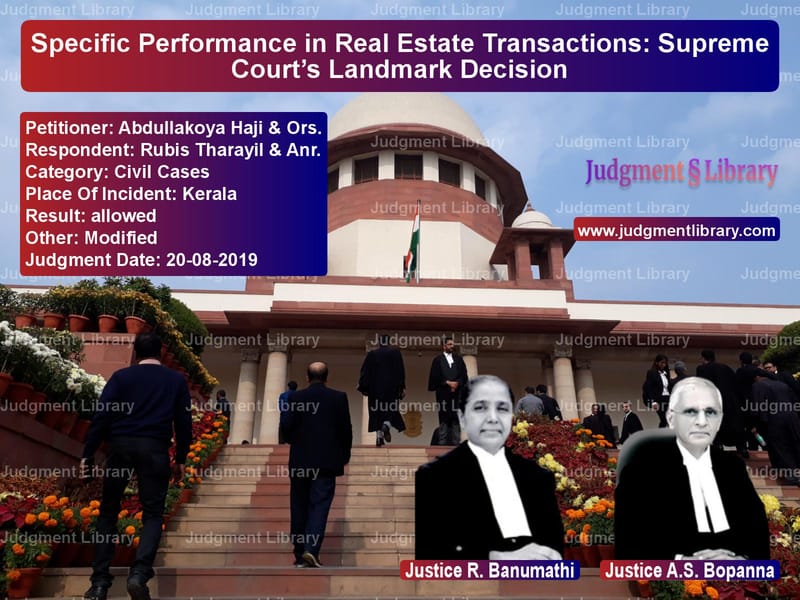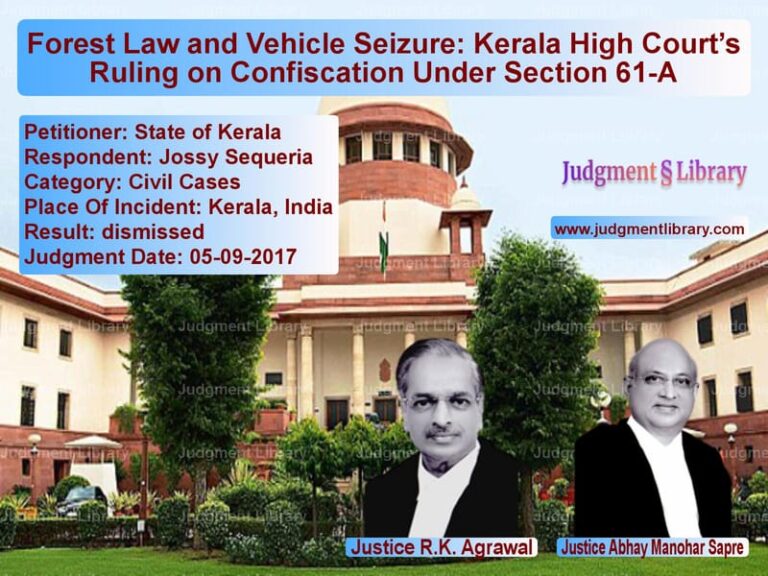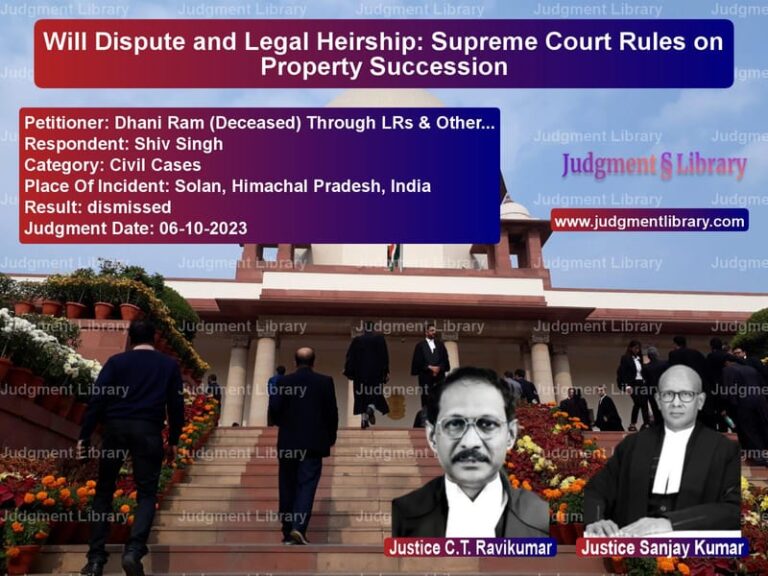Specific Performance in Real Estate Transactions: Supreme Court’s Landmark Decision
The case of Abdullakoya Haji & Ors. vs. Rubis Tharayil & Anr. revolves around a dispute concerning the enforcement of a sale agreement and the principles governing specific performance in real estate transactions. The Supreme Court’s ruling in this case provides crucial insights into contract law, particularly in assessing a buyer’s readiness and willingness to complete the transaction.
The central legal issue was whether the plaintiff (buyer) had demonstrated sufficient financial capacity and willingness to fulfill the obligations under the sale agreement and whether the court should enforce specific performance of the contract.
Background of the Case
The appellants, Abdullakoya Haji & Ors., were the owners of multiple parcels of land in Kerala. They entered into an agreement to sell the property to the respondents, Rubis Tharayil & Anr., on March 26, 2007. The total land area covered by the agreement was 12.775 acres, and the agreed price was Rs. 11,350 per cent of land. The respondents paid an advance amount of Rs. 75 lakhs at the time of the agreement.
The agreement required the respondents to pay another Rs. 75 lakhs by October 15, 2007, after conducting a survey to determine the final area of land. However, the respondents alleged that the sellers failed to provide the necessary title documents, preventing them from completing the payment.
When the sale did not materialize, the respondents (buyers) filed a suit for specific performance of the contract, seeking a court order to compel the sellers to execute the sale deed. Alternatively, they sought the return of their advance payment with interest.
Petitioners’ Arguments (Abdullakoya Haji & Ors.)
The appellants (sellers) contended that:
- The respondents were not financially capable of paying the balance amount, and thus, they failed to perform their obligations under the contract.
- The buyers had entered into a separate agreement with a third party (Ali Khan) for selling the same property, proving that they were not genuinely interested in completing the transaction.
- Since the respondents failed to pay the second installment of Rs. 75 lakhs, the contract was rendered unenforceable.
- The agreement should not be specifically enforced, and at most, the court should award a refund of the advance payment.
Respondents’ Arguments (Rubis Tharayil & Anr.)
The respondents (buyers) argued that:
- They had arranged funds and were always ready and willing to complete the transaction.
- The delay in payment occurred because the sellers failed to provide title documents and clarify ownership issues.
- The alternative agreement with Ali Khan was merely an internal arrangement and did not affect their ability to fulfill the contract.
- They had attempted to make payments, but the sellers deliberately refused to cooperate.
Trial Court’s Decision
The Trial Court ruled in favor of the appellants (sellers) on December 23, 2010, concluding that:
- The respondents had failed to prove their financial readiness to complete the transaction.
- The agreement with Ali Khan suggested that the respondents lacked serious intent to acquire the property.
- Their claim for specific performance was denied, but they were granted an alternative relief – a refund of Rs. 75 lakhs with 9% interest per annum.
High Court’s Reversal
The respondents (buyers) appealed to the Kerala High Court, which on August 21, 2018, overturned the Trial Court’s ruling and directed the sellers to execute the sale deed for Items 1, 2, and 5 of the property.
The High Court ruled that:
- The respondents had demonstrated financial readiness through bank records showing available funds.
- The alternative agreement with Ali Khan was irrelevant to the case.
- The respondents should be allowed to complete the transaction within two months.
Supreme Court’s Observations
The Supreme Court examined the financial documents and the conduct of the respondents and made the following key observations:
- Although the respondents showed a bank balance of Rs. 75 lakhs on October 15, 2007, they failed to demonstrate continued financial capacity beyond that date.
- The agreement with Ali Khan suggested that the respondents were looking to transfer the property without actually purchasing it themselves.
- There was no evidence that the respondents maintained sufficient funds at the time of filing the lawsuit.
- Specific performance is an equitable relief and should be granted only if the buyer proves sustained readiness and willingness to complete the contract.
Key Ruling and Verdict
The Supreme Court set aside the High Court’s judgment and restored the Trial Court’s decision, ruling that:
- The respondents had failed to prove their financial capability to complete the purchase.
- Their conduct in entering into a separate agreement with Ali Khan raised doubts about their genuine intention to buy the property.
- Their claim for specific performance was dismissed, and the only relief available was a refund of Rs. 75 lakhs with interest.
The Court ordered:
“The appellants shall refund the sum of Rs. 75 lakhs with interest at 9% per annum from the date of receipt till the date of repayment, to be completed within three months, failing which the interest rate shall increase to 12% per annum.”
Implications of the Judgment
This judgment sets an important precedent in real estate disputes and contract enforcement:
- Financial Readiness is Essential: Buyers seeking specific performance must prove they were financially capable of completing the transaction at all relevant times.
- Equity in Specific Performance: Courts will not enforce specific performance if the buyer’s conduct raises doubts about their intent or capability.
- Alternative Agreements Can Undermine Claims: Entering into side agreements with third parties can weaken a buyer’s claim for specific performance.
- Limited Relief for Buyers: If a buyer cannot establish financial readiness, they may only be entitled to a refund instead of a forced sale.
The Supreme Court’s decision reinforces that specific performance is not an automatic right but a discretionary remedy that requires strong proof of continuous financial readiness and good faith on the buyer’s part.
Petitioner Name: Abdullakoya Haji & Ors..Respondent Name: Rubis Tharayil & Anr..Judgment By: Justice R. Banumathi, Justice A.S. Bopanna.Place Of Incident: Kerala.Judgment Date: 20-08-2019.
Don’t miss out on the full details! Download the complete judgment in PDF format below and gain valuable insights instantly!
Download Judgment: Abdullakoya Haji & O vs Rubis Tharayil & Anr Supreme Court of India Judgment Dated 20-08-2019.pdf
Direct Downlaod Judgment: Direct downlaod this Judgment
See all petitions in Contract Disputes
See all petitions in Property Disputes
See all petitions in Specific Performance
See all petitions in Judgment by R. Banumathi
See all petitions in Judgment by A. S. Bopanna
See all petitions in allowed
See all petitions in Modified
See all petitions in supreme court of India judgments August 2019
See all petitions in 2019 judgments
See all posts in Civil Cases Category
See all allowed petitions in Civil Cases Category
See all Dismissed petitions in Civil Cases Category
See all partially allowed petitions in Civil Cases Category







